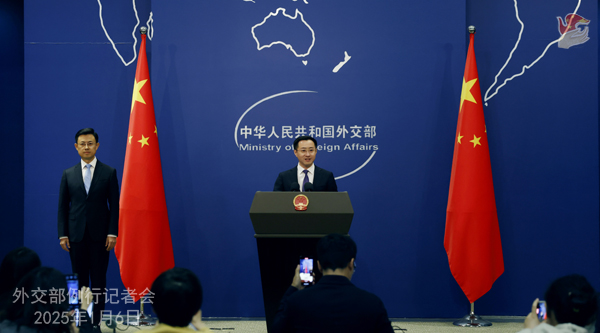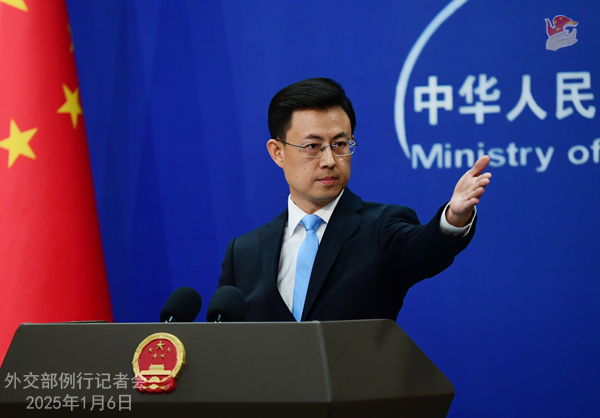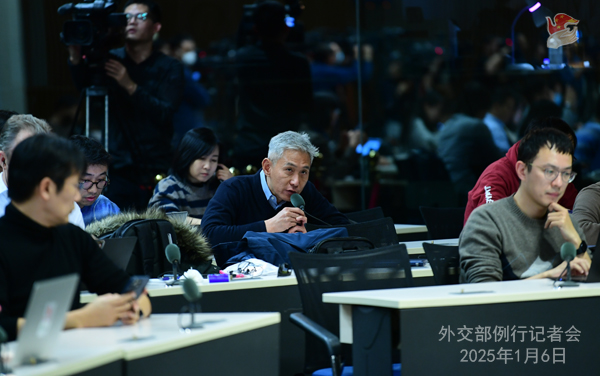
Lin Jian: Ladies and gentlemen, good afternoon. It is with great pleasure that I introduce to you my colleague—Mr. Guo Jiakun, new Foreign Ministry Spokesperson and Deputy Director General of the Department of Press, Communication and Public Diplomacy. He will start holding the regular press conference today as the Foreign Ministry’s 35th spokesperson. Having served in the Foreign Ministry for 23 years, Jiakun has a well of experience in diplomacy and excellent communication skill. Hope you will support his work just as you have supported me and the other spokespersons. With that note, let me give the floor to Jiakun.
Guo Jiakun: Ladies and gentlemen, good afternoon. It is such an honor to serve as Foreign Ministry Spokesperson and a great pleasure to meet all of you. From this podium, I will do my level best to communicate China’s foreign policy with timeliness, accuracy and clarity and present to you the remarkable stories of Chinese modernization, so that through your writing, your lens and your microphone, the world gets to know a true, multi-dimensional China in an all-round way. I look forward to working closely with you and to having good mutual understanding and support with all of you. Thank you!
At the invitation of the government of the Republic of Ghana, President Xi Jinping’s special envoy and Vice Chairperson of the Standing Committee of the National People’s Congress Hao Mingjin will attend President John Dramani Mahama’s inauguration in Accra, the capital city of Ghana, on January 7.
CCTV: Foreign Minister Wang Yi this week officially started his visit to four African countries, which also marks the 35th year for the Chinese foreign ministers to make Africa their first overseas destination at the start of the year. Can you tell us how does China see Africa and what’s China’s view on the development prospect of African countries?
Guo Jiakun: China is the world’s largest developing country and Africa is the continent home to the largest number of developing countries. China and Africa share time-honored friendship. Under the personal guidance of President Xi Jinping, the Beijing Summit of the Forum on China-Africa Cooperation (FOCAC) was successfully held in 2024 and China-Africa relations entered the new phase of an all-weather China-Africa community with a shared future for the new era. The fine tradition for Chinese foreign ministers to start their year-round overseas visits with a trip to Africa speaks to the growing profound friendship between China and Africa and the continuity of China’s friendly cooperation with Africa. China always believes that Africa is never “the lost continent,” but the land of hope and source of dynamism.
Africa betters global governance with the power of transformation. Under the guidance of Pan-Africanism, African countries have accelerated the integration process of seeking strength through unity and pursuing development and revitalization, playing an increasingly important role in international affairs. Africa powers global economic growth. The African Development Bank predicted that Africa’s average growth would rise to 3.7 percent in 2024, exceeding the projected global average. Among the 20 fastest growing economies in the world, 10 are African countries. Africa is one of the birthplaces of the civilization of mankind, and also a land full of vigor and hope, with 70 percent of its population under the age of 30, the youngest in the world.
Amid the transformation in the world unseen in a century, the booming development of the Global South, such as China and Africa, has a profound impact on world historical progress. A stronger and more developed Africa will surely make greater contribution to world peace and development.

Yonhap News Agency: The ROK’s Joint Chiefs of Staff said that the DPRK launched an intermediate-range ballistic missile towards the ROK’s eastern waters. This is the second ballistic missile the DPRK fired since November last year. How does China see the launch?
Guo Jiakun: China’s position on the Korean Peninsula issue is consistent and clear. On relevant launch activities, I have no new comments to make.
Reuters: India said that it has conveyed to China its concern about China’s development of its huge hydro dam in Yarlung Zangbo in Tibet. Today we have the US National Security Advisor Jake Sullivan in India to listen to India’s concern. My question is, has China done anything or said anything to India to reassure India and does the US have a role to play here?
Guo Jiakun: On the hydropower project in the lower reaches of the Yarlung Zangbo River, China has made its position clear. Let me reiterate that the decision to build the project was made after rigorous scientific evaluation and the project will not have a negative impact on the ecological environment, geological conditions and the rights and interests related to water resources of downstream countries. Rather, it will, to some extent, help with their disaster prevention and reduction and climate response.
Yomiuri Shimbun: Last Friday, the US government blocked Nippon Steel of Japan from buying US Steel. Some people in the American industry have criticized that this decision is unfair. There have also been reports that this decision should be welcomed by the Chinese steel industry and government. How does the Chinese government react to this?
Guo Jiakun: We noted relevant reports. We don’t comment on the specific business deal between the US and Japanese companies. We’ve always believed that countries should uphold the principle of fair competition and the WTO rules, and play an active role for an orderly global market and the health of international trade.
China Daily: This year marks the 30th anniversary of the founding of the WTO. We noted a recent article in Forbes saying that if the protectionist threats materialize, not only global trade will be damaged, but the WTO’s dispute settlement mechanism will face a crisis. An article from The New York Times says that the “small yard, high fence” strategy came with sharp economic and diplomatic costs. US companies worried that the high fence might shut them out from the Chinese market. What is your comment?
Guo Jiakun: The WTO is at the core of the multilateral trade system. Over the past 30 years since its founding, the WTO has, through providing an open, stable and predictable institutional environment, ensured that global trade is conducted in an overall steady and orderly manner, enhanced trade and economic cooperation between members, supported developing economies in participating in and benefiting from economic globalization, and made important contribution to improving the wellbeing of people of various countries and promoting sustainable development.
Free trade is an essential condition for world economy to grow. The ultimate goal of free trade is to achieve mutually beneficial result and common development. Engaging in protectionism and building “small yard, high fence” seriously disrupts the global industrial and supply chains and harms the common and long-term interests of all countries. China will continue to honor its commitments made at its accession to the WTO, and work with the rest of the world to safeguard the multilateral trade system with the WTO at its core, promote global trade and investment liberalization and facilitation, and deliver more benefit to the world.

AFP: The US Department of the Treasury last Friday sanctioned a Beijing-based cybersecurity company, accusing it of helping Chinese hackers infiltrate US telecommunication system and conduct surveillance. What’s China’s comment?
Guo Jiakun: On the so-called issue of cyberattacks, China has made clear our position more than once. China has all along firmly opposed hacking and fights it in accordance with law. We urge the US to stop using the issue of cybersecurity to vilify and smear China. For quite some time, the US has been trumpeting so-called “Chinese hacking” and even using it to impose illegal and unilateral sanctions on China. China firmly rejects this and will do what is necessary to safeguard our lawful rights and interests.
Beijing Youth Daily: Recently, Secretary-General of the Shanghai Cooperation Organization (SCO) Nurlan Yermekbayev said in an interview that it is wrong to compare NATO and the SCO. The SCO is not a product of the Cold War, and it was not created in the conditions or for the purpose of confrontation with anyone. The organization emphasizes the non-aligned and de-ideologized nature and is for peace and cooperation. Do you have any comment on this?
Guo Jiakun: I noted Secretary-General Nurlan Yermekbayev’s remarks.
Since its founding 24 years ago, the SCO has attracted an increasing number of partners and boasted higher-quality development. It has now become a regional organization that covers the largest area and population. The code of success for the SCO, which grows with strong vitality and strong impetus for cooperation, is that it puts forward and practices the Shanghai Spirit, a creative vision that champions mutual trust, mutual benefit, equality, consultation, respect for diversity of civilizations and pursuit of common development. This transcends the outdated idea of the clash of civilizations, Cold War mentality and zero-sum mindset as well as the old paradigm of forming exclusive circles, and turns an entirely new page on international relations.
As the rotating chair of the SCO, China will act on the slogan of “Upholding the Shanghai Spirit: SCO on the Move,” bring member states together for deeper cooperation in the fields of politics, security, economy and cultural and people-to-people exchanges, and jointly build an even closer SCO community with a shared future.
AFP: The Taiwan authorities yesterday said that in 2024, Taiwan’s government faced an average of 2.4 million cyberattacks per day, with most of them attributed to Chinese cyber forces. Can you confirm that?
Guo Jiakun: That’s not a question about foreign affairs.